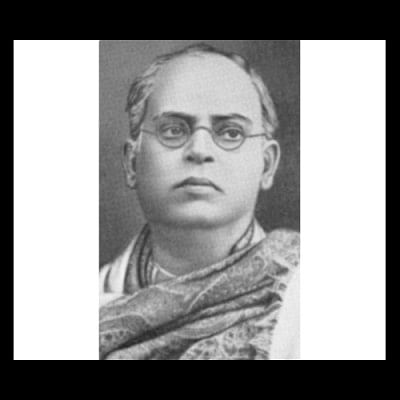DL ROY Patriotism to the fore

Way back in 1993, I was presented a rare audio cassette with an original song by Dilip Kumar Roy, a celebrated singer of the 1930s and son of the illustrious DL Roy. The cassette was given to me by Dr. Khan (a reputed physician settled in the US) who had driven all the way from Ohio to Pennsylvania with the cassette.
He had heard me sing the famous Dwijendra Lal Roy song, "Dhon-o dhanney pushpey bhora" at a concert in the US, and said that I should keep the original song with me. It remains one of my priceless possessions.
Most of us are used to listening to a much simpler style; but the original tune has a classical touch to it.
If we look back to the early 1940s a new trend of Bangla songs, known as Gana Sangeet or peoples' songs, was introduced by those who worked against all kinds of repression in society. The songs were imbued with patriotic fervour and reflected the desire for a society free from exploitation.
Rabindranath, Mukundo Das and Kazi Nazrul Islam -- the three main poets of Bengal, composed the largest number of patriotic songs. The other two poets and composers -- Rajanikant and DL Roy -- also composed songs belonging to this genre.
Born on July 19, 1863, DL Roy was initially trained in classical music by his father Dewan Kartikeya Chandra Roy, a pioneer amongst the Bengali classical vocalists. After completing his Masters in English from the Presidency College, DL Roy went to England for further studies. There he learned the western forms of music.
On his return to India he joined government service as a Deputy Magistrate. During the Swadeshi movement in 1905, DL Roy was inspired by the sentiments of nationalism and this was reflected in his compositions, which veered away from the humorous songs, plays and poetry that he had long composed. Around 500 songs, including "Bango amar jononi amar" and "Oi moha Shindhur opar thekey" were composed by him.
DL Ray was a trendsetter for other musicians.
Rajanikanta Sen, another of the pancha kabi (five major poets) of Bangla songs, was basically a lawyer in Rajshahi. Rajani was deeply influenced by DL Roy's style and soon began to compose similar songs. He was also influenced by the Swadeshi movement and composed songs reflecting the patriotic movements of that era.
"Mayer deya mota kapor matheye tuley nere bhai," by Rajani Kanta, carried the important message of unification and harmony. This song, which called for a total boycott of foreign goods, was a beacon of hope during the Swadeshi movement.
The Indian People's Theatre (IPTA) was founded in 1943. This was a movement, which sought to enlighten the masses and organise the people in the struggle for economic freedom and justice. The musical squad of IPTA was initiated by musical minds such as Binay Roy, Jyotirindra Maitrya, Hemanga Biswas and Salil Chowdhury.
These songs that were previously known as patriotic songs, were now popularly termed as Gana Sangeet.
During the Liberation War of Bangladesh, these and many other songs encouraged the struggling masses and heightened their yearning for a motherland free of injustice.

 For all latest news, follow The Daily Star's Google News channel.
For all latest news, follow The Daily Star's Google News channel. 



Comments